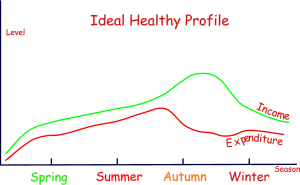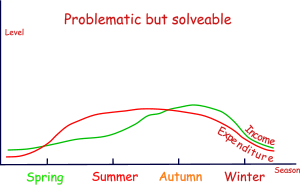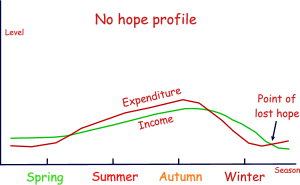In ‘Money for all seasons I’ I already described the seasons of our lives according to income and spending. I also set out some expectations and used these to ask you, my readers, to position yourselves within a season. In brief, I see the expectations of pitfalls in different ‘seasons’ are the following.
In Spring you can expect:
- Low income;
- Low day-to-day expenses;
- Investment mainly in education and competencies; and
- Low or negative cash flow.
…and should:
- Keep debt optimal and not borrow more than you absolutely need; and
- Move into Summer with very low or no consumer debt.
In Summer you can expect:
- Increasing income;
- Increasing expenditure;
- Relatively low cash flow; and
- Accumulation of liabilities.
…and should:
- Increase cash flow;
- Invest;
- Minimise liabilities; and
- Enter Autumn with no consumer debt.
In Autumn you can expect:
- Lifetime highest income from a variety of income streams.
- Lowest expenses.
- High cash flow.
- Aggressive and prolific investing.
…and you should:
- Invest aggressively and prolifically.
In Winter you can expect:
- Lower-income mainly from pensions and investments; and
- Higher expenses are mainly on medical bills and care.
…and you should:
- Ensure you have enough to live your life without becoming a liability.
Today I will use this framework to map several ideal ‘financial profiles’ and illustrate how these can be used as a simple and straightforward tool for checking on your financial health. The profiles below are just an illustration – you can map yours exactly where you using historical data (if you keep any; being a financial nerd I have records of income and expenditure going four years back – anything before that I’ll have to guess by the outcome) and projections.
Ideal financial health profile
Below is an ideal financial health profile. This shows the expected cash flow for each of the seasons of life. Some may argue that the cash flow should be greater in Winter; I am a firm believer that perfect financial management means to have enough money left for a jolly pint of beer (or nice bottles of wine) of your relatives and friends after you are gone. Not one for worrying about my children’s inheritance; were I to leave inheritance it would be gold stored under my bed.
Problematic but ‘all right at the end’
This profile shows negative cash flow for most of Spring and some of Summer which means that consumer debt has been built. Given that investments in Autumn can’t be as large and aggressive as in the ideal case, this in turn means that cash flow is very precarious in late Autumn and early Winter but if sufficient control is exercised (and medical bills are kept relatively low) it is still possible to live one’s life without becoming a liability. There is not even a question about inheritance under this scenario.
The profile of despair
This profile shows consistent negative cash flow and accumulation of debt till early to mid Autumn. This means that investments are not possible which leads to what I have called ‘the point of no hope’ – this is the point where the income and expenses curves cross again in Winter. Simply put, people who have this financial profile run out of money in their Winter and either become a liability to their children or …
I would expect that most people will have a variation of the second profile. I know my profile is far from ideal but it is not the profile of despair yet. Off to do my profile and to plan how to avoid the ‘point of no hope’ – selling drugs when seventy and going to prison is not an option!
What is your financial health profile?



Hon – I have been waiting for part 2 of this as it struck so many chords with me in part one.
Thank-you so much – this makes so much sense and cuts through all of the financial “clutter” there is on the web. It also lets me have a sneaky optomistic peak into the future and for that I am very grateful.
@Elaine: If your optimism has anything to do with the fact that it is still not late for you (although you didn’t save all you can when you were 19)and you can end up in the first profile group – yeah, you are right.
I think many of us experience all seasons at some point and will have different profiles,but the goal is to stay as close to the ideal as possible. I really like how you mapped this out. It really simplifies it for people.
@Miss T: The seasons are the time of your life: so you are either in Sping (before you hit 30, I think) or you are elsewhere – this part of the profile is not negotiable. What is negotiable and will be very individual specific are how do the lines go – whether they cross and when; so crossing early on is not pleasant but not dramatic either. Crossing when we enter Winter (or getting old, put bluntly) spells real trouble.
Like it for its simplicity – our profile will depend very much on what decisions the small people make as they will be up to their highest expenditure as we hit and go through Autumn but we will have slammed the debt down by then 🙂
@Dorastar: What is best for our children is to have parents who are not a burden in their Winter; however, there is a whole array of decisions and options that can be taken. This is an illustrative tool to help make these decisions – and of course doesn’t make these any easier to execute.
I will not be a burden I will still be teaching till I am 100 and then drop dead in service (that is the govt plan isn’t it?) Just voted so very political and sceptical tonight sorry.
Interesting and useful analogies for a lifetime of money management, I like it.
@Drew: Glad you like it, Drew. I was aiming for continuity – what we get with other financial tools (net worth calculators etc.) are photographs when we need a movie to connect past, present and future in our personal finance.
I was curious what Part II would hold. Your seasonal analogies are very well done. These profiles should be useful tools, I’ll have to take a look at how we are doing. Thanks for the wisdom and insight. I too don’t see selling drugs at 70 and prison as an option.
@Cil Burke: Glad you find these useful, Cil. I am going to do ours as well; thing is, John and I are in different seasons and have shared finances. Have to think about this one. As to drugs and prisons – I am keeping this in mind only as a last resort.
Having worked in financial planning for 16 years, I can verify just how true these profiles are….(as if you needed my verification!). People with children at home are shocked at how much disposable income they suddenly have when junior leaves the nest. It’s like a whole new world!
@AverageJoe: But you see, Joe, I am very, very grateful for your verification. It means I am onto something useful here. Thanks for letting me know!
Can’t wait till mine go then! Although current govt changing policies on HB will mean there are an awful lot more of them staying at home an awful lot longer (best get out there and start earning kids – there are some big houses with chimneys round here 😉 )
Very interesting. I stared at the graphs for probably five minutes. Especially I was enchanted with “no hope” profile. I’ve been there before but luckily I either never realized or I never got to the point of no hope.
@Aloysa: The profiles show that if one wakes up in late Summer, early Autumn they can avoid the ‘point of no hope’. Anything after mid- Autumn spells trouble – we won’t have what to live on when older (sxcept if we are very inventive). Another implication is that people shouldn’t get so obsessed with saving when young – compounding is great but investing in one self has even higher returns :).
I need to do what I’ve been planning on doing for ages, and sort out my short, medium and long-term savings. I think it might be an idea to put time aside to review them regularly, as I’ve made some changes to my outgoings and know what I was going to do with the extra cash, but haven’t actually done it yet. It’s not doing me any favours sitting in my current account